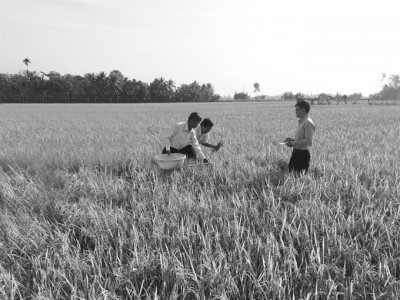Vinh Long rice farmers go organic, reap rewards

Agriculture experts examine an organic rice field in Hamlet 9 in Mỹ Lộc Commune in Vĩnh Long Province. — VNS Photo
HCM CITY — Nguyễn Hữu Phước of Hamlet 9 in Mỹ Lộc Commune in Vĩnh Long Province, grows organic rice on 7,000sq.m of land.
“I switched to organic farming last year and this is my third crop.”
Phước is among 74 farmers in Mỹ Lộc growing organic rice as part of a pilot project that aims to bring consumers safer quality products and enable sustainable agricultural production.
Việt Nam is among the top five rice exporters in the world, and the Củu Long (Mekong) Delta accounts for 90 per cent of the exports.
But rice cultivation in the delta, which also produces more than half of the country’s rice, is largely done in small fields with excessive chemicals and fertilisers.
The problem is being addressed effectively by the pilot project that has brought together many small farmers who pool their lands and achieve economies of scale, Lê Văn Chiến, chairman of the Mỹ Lộc Commune People’s Committee, said.
The project, implemented by the Saigon Union of Trading Co-operatives (Saigon Co.op), the local administration, Tân Tiến Agricultural Co-operative and some companies, began with the 2016 summer-autumn rice crop on an area of 44.3ha with 74 farmers, he said.
Dương Văn Thành, director of the co-operative, said farmers initially faced difficulties in shifting to organic farming.
Besides, productivity was down. But with Saigon Co.op pledging to buy all the rice at higher than normal prices, farmers felt more secure, he said.
Nguyễn Văn Phinh of Hamlet 11 in Mỹ Lộc Commune, said all 22 farmers in his hamlet complied strictly with the methods outlined by technical staff.
“Productivity has been low in the initial stages, but we accept it.”
Chiến said: “Compliance with organic farming methods not only provides safe products to consumers, but also helps water sources and seafood species to gradually recover.
“Farmers’ health is protected too as they do not have to come in contact with harmful plant protection chemicals.
“Organic farming is also more beneficial to the soil.”
Confirming the environmental benefits of organic farming, Prof Dr Phạm Văn Kim, a former lecturer at Cần Thơ University, said "aquatic species brought in by the floods could not survive in rice fields in the past, but after two to three organic crops, some species can now be found".
"This offers long-term and sustainable value to the eco-system, especially agriculture," he said.
Expansion
Thành said demand for organic rice was increasing both in the domestic market and abroad, but its cultivation remains modest.
Despite facing difficulties such as low productivity, high costs and silted irrigation systems, the co-operative plans to expand the area under organic rice, he said.
Thành and other farmers in the project agreed that to persuade more farmers to switch, closer links need to be created between farmers, businesses, scientists and the Government, especially farmers and businesses, to reduce costs and improve productivity, and improve farmers’ profit.
They also wanted the prices of organic fertilisers to be reduced.
According to Lê Thị Tú Anh, chairwoman of GAP Agriculture JSC, all the fertilisers supplied to farmers involved in the project are imported from the US and supplied at a 21 per cent discount.
When farmers persevere with organic farming, the fertility of the soil would improve, meaning costs, especially of fertilisers, would reduce and productivity and profit would go up, she said.
Instead of growing three rice crops, the local government and farmers are considering other models like two rice crops and aquaculture and two rice crops and one crop of other produce like maize, soya bean, sesame, or vegetables to regenerate the soil.
Trần Văn Rón, the Vĩnh Long Province Party Secretary, said: “Based on the initial results of the project, the province would continue to expand the scale of the project.”
It would instruct Mỹ Lộc Commune authorities and Tân Tiến Agricultural Co-operative to bring in more farmers and step up propaganda to ensure the farmers do comply with the agreed farming techniques.
Phạm Trung Kiên, deputy general director of Saigon Co.op, said the project was part of his company’s master plan to integrate itself deeply into the rice value chain to bring consumers safer quality products at reasonable prices.
“Saigon Co.op promises long-term participation in the project and support to farmers to enable the project to expand further, which will enable sustainable agricultural production for both consumers and producers.
Related news
 Mekong Delta farmers begin shrimp harvest
Mekong Delta farmers begin shrimp harvest Farmers in the Cửu Long (Mekong) Delta region have begun this year’s first harvest season of brackish water shrimp
 Vietnam's coffee prices leap-frog London, trade dull
Vietnam's coffee prices leap-frog London, trade dull The premiums quoted this week mark the first time since September 2016 Vietnamese beans have stood above London futures prices.
 Đồng Nai aims to save pig farming industry
Đồng Nai aims to save pig farming industry The Đồng Nai’s administration on Thursday discussed measures to rescue the southern province’s pig-farming industry following the precipitous drop in the prices